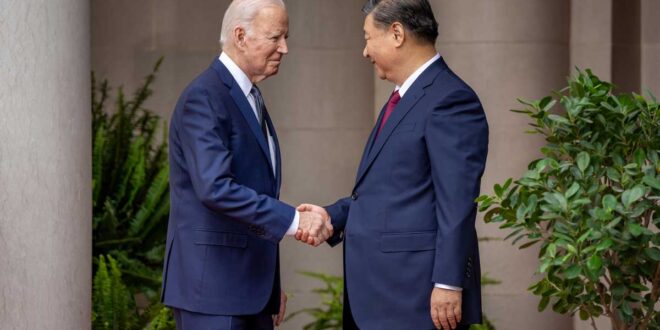Chinese President Xi Jinping and U.S. President Joe Biden on Wednesday, Nov.15, had a candid and in-depth exchange of views on strategic and overarching issues critical to the direction of China-U.S. relations and on major issues affecting world peace and development, Xinhua informs.
The meeting was held at Filoli Estate, a country house approximately 40 km south of San Francisco, California. Biden warmly received Xi when he arrived at Filoli Estate.
Noting that the world today is undergoing profound changes unseen in a century, Xi said there are two options for China and the United States – one is to enhance solidarity and cooperation, join hands to meet global challenges and promote global security and prosperity; and the other is to cling to the zero-sum mentality, provoke rivalry and confrontation, and drive the world toward turmoil and division.
The two choices point to two different directions that will decide the future of humanity and Planet Earth, he said, adding that the China-U.S. relationship, which is the world’s most important bilateral relationship, should be perceived and envisioned in this broad context.
For China and the United States, turning their back on each other is not an option, Xi noted, stressing it is unrealistic for one side to remodel the other, and conflict and confrontation has unbearable consequences for both sides.
Major-country competition cannot solve the problems facing China and the United States or the world, he continued, noting that the world is big enough to accommodate both countries, and one country’s success is an opportunity for the other.
It is important to fully utilize the restored and new mechanisms in foreign policy, economy, finance, commerce, agriculture and other fields, and carry out cooperation in such areas as counternarcotics, judicial and law enforcement affairs, AI, and science and technology, he added.
Xi also called on China and the United States to jointly shoulder responsibilities as major countries. The problems facing human society cannot be solved without cooperation between major countries, Xi said.
China and the United States should lead by example, step up coordination and cooperation on international and regional issues, and provide more public goods for the world, he said.
Xi also elaborated on China’s principled position on the Taiwan question. He pointed out that the Taiwan question remains the most important and most sensitive issue in China-U.S. relations. China takes seriously the positive statements made by the United States in the Bali meeting, he said, adding that the U.S. side should take real actions to honor its commitment of not supporting “Taiwan independence,” stop arming Taiwan, and support China’s peaceful reunification. China will realize reunification, and this is unstoppable, Xi stressed.
Noting that U.S.-China relationship is the most important bilateral relationship in the world, Biden said that a U.S.-China conflict is not inevitable, adding a stable and developing China serves the interests of the United States and the world, and China’s economic growth is beneficial to both the United States and the world.
Reaffirming the five commitments he made at the Bali summit, Biden said that the United States does not seek a new Cold War, it does not seek to change China’s system, it does not seek to revitalize alliances against China, it does not support “Taiwan independence,” and that it has no intention to have a conflict with China.
The United States and China are economically interdependent, he said, adding that the United States is glad to see China’s development and prosperity, and has no intention to halt China’s economic development or to contain China, nor to seek “de-coupling” from China. The United States adheres to the one-China policy, he noted.
The two presidents agreed to promote and strengthen bilateral dialogue and cooperation in such areas as China-U.S. government talks on AI and the establishment of a working group on counternarcotics cooperation. They agreed to resume, on the basis of equality and respect, high-level communication between the two militaries, the China-U.S. Defense Policy Coordination Talks, and the China-U.S. Military Maritime Consultative Agreement meetings, and to conduct telephone conversations between theater commanders.
The two leaders underscored the importance of working together to accelerate efforts to tackle the climate crisis in this critical decade.
Presidents Joe Biden and Xi Jinping emerged from their first meeting in a year betting that a handful of small victories will arrest a surge in US-China tensions that has unnerved neighboring nations and threatened global economic growth, notes Bloomberg.
Expectations were low owing to deep-seated differences over trade, Taiwan and human rights, and even the summit’s modest accomplishments were hard-won. Those included deals to try to address the fentanyl crisis and to restore military communications severed after then-House Speaker Nancy Pelosi visited Taiwan last year.
“We’re in a competitive relationship, China and the United States,” Biden told reporters after more than four hours of talks with Xi. “But my responsibility is to make this rational and manageable so it doesn’t result in conflict. That’s what I’m all about.”
In a sign of how much remains to be done, there was no evidence of progress on bigger issues like US curbs on microchip exports, tariffs or tensions in the South China Sea, where Chinese and US ships and planes have had a series of provocative encounters. Xi didn’t get what he needs most — deals to help boost the Chinese economy, which is still struggling to emerge from the Covid-19 pandemic.
“Is this meeting going to improve the relationship? The answer is no, but that’s not the objective — the objective is to frame and contain the risks of it worsening,” said Kurt Tong, a former senior US diplomat in Asia who’s now a managing partner at the Asia Group. He characterized the results as “relatively small” deliverables.
The meeting outside San Francisco was the culmination of intense diplomacy to salvage a relationship that had almost completely broken down over trade disputes, Russia’s invasion of Ukraine and the alleged Chinese spy balloon that drifted over US territory in January.
But it was also marred by what has now become an almost routine event for Biden at gatherings like this. After offering carefully scripted remarks to reporters, Biden couldn’t resist answering a reporter who asked if he still thought Xi was a ‘dictator’.
Chinese leaders hoped to use the meeting “as a way to try and reframe the relationship,” said Martin Chorzempa, senior fellow at the Peterson Institute for International Economics. “And it sounds like the US is emphasizing that it’s not going to budge on this point.”
Xi echoed that idea in his dinner speech. “The number one question for us is, are we adversaries or partners?” Xi said. “If one sees the other side as a primary competitor, the most consequential geopolitical challenge and the pacing threat, it will only lead to misinformed policy making, misguided actions and unwanted results.”
“I believe they were some of the most constructive and productive discussions we’ve had,” Biden said at a press conference, following a summit aimed at steadying a bilateral relationship under intense strains. “We’ve made some important progress, I believe.”
 Geostrategic Media Political Commentary, Analysis, Security, Defense
Geostrategic Media Political Commentary, Analysis, Security, Defense





